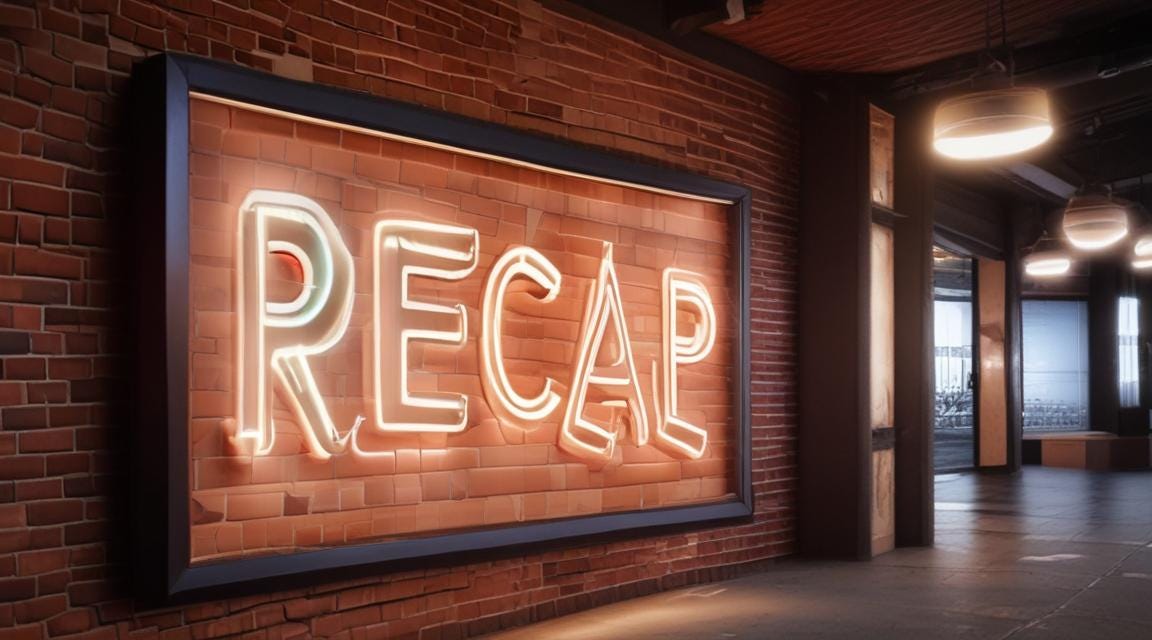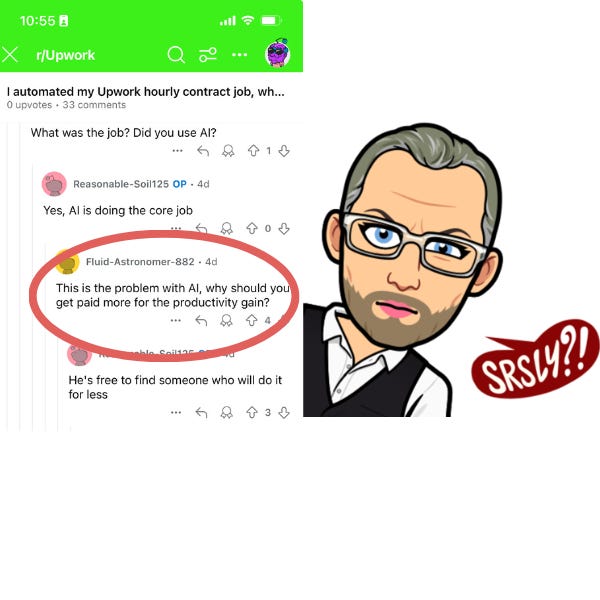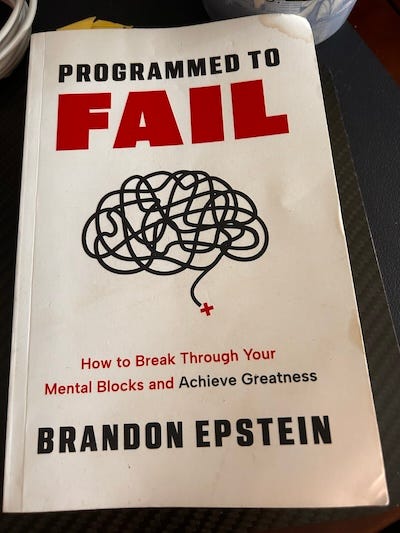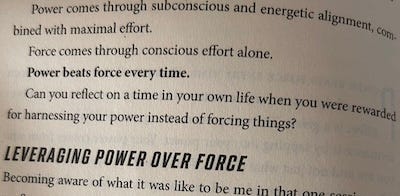Client systems, Power vs. Force
How I made it work this week
In today’s wrap-up… Power v. Force
Upwork 'Onramps': My Secret Sauce for More Clients & Less Guesswork (Audio)
Why I created 'onramps' for working with clients on Upwork and included the pricing on my profile. (Audio only)
What I Skipped This Week
Ok, it's confession time. Here is where I share what I put off this week and what I plan to do about it.
This week I wanted to be able to share which efforts for getting clients I want to focus on next. As many of you may be experiencing too, freelancing is different than it was a year ago.
AI, the economy, the election.... it's clear Upwork and other platforms are making changes too.
If you're on the platform, you know. First, it was the crazy number of connects needed to apply to a project. Then, it was clients having to pay a fee to post a job. Now a freelancer has to spend connects to even respond to an invitation.
The changes I've felt the most are fewer invitations I get now compared to the hayday it used to be.
I used to get 1 or 2 sometimes 3 or more invitations nearly every day.
Now, I might get 1-2 per week?
Luckily, Upwork is only a part of my solo income. The rest comes from off-platform client-getting tricks.
I've decided which of my new client systems I'll use.
Stay tuned. Next week, I'll share it with you here.
Reddit Reactions
Speaking of Upwork
Aside from Reddit, Substack and LinkedIn, I’m generally not on socials.
And I spend more time than I should scrolling reddit. I’m subscribed to an array of subs for personal interest type stuff. (r/popping, r/nextfuckinglevel, r/MadeMeSmile.)
I’m also subscribed to r/productivity, r/ADHD, r/self, etc., where I find other perspectives and things to help me to improve in so many areas that need it.
One redditor really missed the point.
For context:
OP is a freelancer.
They found a way to automate a project that used to be done manually.
It used to take them hours, now it doesn’t.
They (smartly) wanted to change the format and go fixed rate instead of working on an hourly one.
They admitted to the sub using AI to automate this.
To which one commenter replied:
My hot take:
Clients pay for the result, not the process.
I mean isn't that the whole point? McDonald’s didn’t lower their prices when automation replaced labor costs. And no one expected them to.
(Can we talk about the McDouble’s steady price increase since the dollar menu?)
The redditor’s comment literally does not compute for me. Maybe it was a trolling client.
Don’t be Afraid to Profit from AI
Back when I first heard the quote, "AI won't replace you—but humans who know how to use AI will". I immediately understood it.
Because I can run circles around the me without AI.
I was already good in major categories of digital marketing before AI was used as widespread as it is now.
With AI in hand though, knowing where to use the tech to my advantage is just how to do business.
Me not using AI would be like an accountant who doesn't use a calculator. By this guy's logic we should pay an abacus-wielding accountant more.
If I'm getting the same or better results when I automate, is there an ethical dilemma if the client is none the wiser?
There's 2 issues I have with this redditor's comment:
1. It's not about time, it's about value
The Problem: Should you only get paid for your actual work time? Forget your years of experience that helped you find a better, faster way. The client doesn't get to be the sole enjoyer of your labor fruit, do they?
Good clients know and will pay for the value they get. They want the results, not more hours worked.
What Makes Sense: If a tool like AI helps deliver those results quickly, do it.
2. Not using the tools that could help anyone work smarter
The Problem: The commenter doesn't see that using AI is like using any tool that helps you work better and faster. Take the accountant using a calculator instead of an abacus—of course, they'd get more done. With fewer errors.
The same goes for AI.
What Makes Sense: My only concern is if there was a drop in work quality or that over automation might hurt the client experience. But, that's not an issue with using AI itself; it's a problem of execution. If the work is still good (or even better), then using AI is a win-win for both the you and the client.
You should be paid for the value you provide or results you bring, not just your time spent. Using AI to work faster and get great results is a good thing.
Power v. Force
I’ve started reading more and I'm really enjoying this book. Early in the reading, a line jumped out so vividly, I had to quickly grab a highlighter so I could come back to it.
I have since ended up coloring the whole thing.
The line I want to talk about today is: “Power beats force every time.”
In the context the book delivers, this made me stop hard and reflect.
The concept of "power vs. force" can help you. Especially if you're worn out from trying to get new clients or struggling to make enough money.
Let me break it down.
What "force" looks like for you:
You’re Pushing Too Hard
In "force" mode, you’re working too hard. You're doing long stretches, late nights, missing personal events. You’re taking any job, and stressing about finding new clients.
This feels exhausting, like you're constantly swimming against the current.
You’re Worrying About Money
You’re concerned that if you don’t take that next job no matter what, you won’t have enough money this month.
You’re taking on work for clients that you don’t really like, which just makes you everything more stressful and you feel even more tired.
on the other hand..
What "power" looks like for you:
You Do What You’re Good At
When you work from a place of "power," you focus on what you’re really good at and what you enjoy.
Instead of trying to do everything, you concentrate on the things where you can really shine. Your work feels easier and more fun.
You Attract the Right Clients
Focusing on your strengths will attract clients who fit into your ecosystem.
Instead of jumping from one small job to the next, you find clients who stick around longer and pay better.
How to Use This Idea:
Save Your Energy
Epstein discusses using breath and focus to achieve more with less effort. That might take practice. But, there are other ways to save your energy.
A good start is to set boundaries.
Think of that client who is a time (or soul) suck?
What boundaries do you need to set?
Also, are you taking enough chill time to stay productive when you need to?
Think Long-Term
Moving from "force" to "power" is about changing how you think. You stop worrying about short-term survival. You start to think about your long-term best interests.
It's time to say no to jobs that don't fit. Trust that better opportunities will come.
Stick around and I'll show you how to fast track this.
Quality Over Quantity
Instead of working with many clients, you focus on nailing it for a few good ones. Set yourself up for and start getting retainers. They help you build a stronger, long-term client relationship.
Retainers are steady, predictable pay.
I'll talk about how to get your first or next retainers in September.










Hey this is 🔥 🔥🔥🔥🔥
Great inside info 🙌🙌